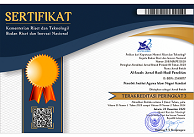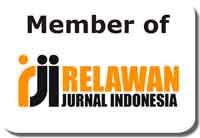Relasi Kuasa Ulama Sufi dan Negara dalam Kultur-Budaya Politik Indonesia
Abstract
This article examines the critical role of the dimensions of Sufism represented by Sufi ulama in the public sphere (political power) state, either directly or indirectly. In Indonesian historicity, the relationship between Sufi ulama and the state has lasted centuries, even to the modern era. In political theory, there is a "descending of power" and an "ascending of power". Descending power is identical to religiopolitical power, namely power based on religion by placing Sufi scholars as representatives of the people and above the king's power. Power is interpreted as a political system that separates religion and state. This problematic relationship places Sufi ulama in a transcendent way to become part of the state both directly and remotely. Examples of ascending of power are shown clearly through the figures of Habib Lutfi bin Yahya and KH. Maimun Zubair (Mbah Maimun) is in the midst of a potential nation clash during the 2019 presidential election process. This study is based on secondary sources in related references and primary sources. The primary source is based on the thoughts of a Sufi teacher and the murshid of Majelis Shalawat Kubro, Shalawat Muhammad, and Shalawat Adlimiyah in East Java.
Keywords
Full Text:
PDFReferences
Al-’Arabi, Ibnu. Ibnu Al-‘Arabi, Al-Futuhat Al-Makkiyah, Vol. 9,. Vol. 9. Bairut: Dar Sadar, 2004.
Artha, Arwan Tuti. Dunia Spiritual Suharto: Menelusuri Laku Ritual, Tempat-Tempat, Dan Guru Spiritual. Yogyakarta: Galang Press, 2006.
Azra, Azumardi. Jaringan Ulama Timur Tengah Dan Kepulauan Nusantara Abad Ke-XVII-XVIII: Akar Pembaharuan Islam Di Nusantara. Jakarta: Prenada Media, 2004.
Baidhawy, Zakiyuddin, Pancasila Tauhid, Sosial Dalam, Kehidupan Berbangsa, and Dan Bernegara. “Pancasila Tauhid Sosial Dalam Kehidupan Berbangsa Dan Bernegara.” Maarif (2016).
Bangunjiwa, Ki Juru. Belajar Spiritual Bersama “The Thinking General". Yogyakarta: Jogja Bangkit, 2009.
Bidabad, Bijan. “Social Changes: An Islamic Sufi Approach.” International Journal of Shari’ah and Corporate Governance Research (2019).
Bindaniji, Muhamad. “Traces of Māturīdīsm in the ‘Ulamā’s Works in Nusantara in the Seventeenth Until Nineteenth Centuries.” ISLAM NUSANTARA: Journal for Study of Islamic History and Culture (2020).
Bruinessen, Martin V A N. “Sufism and the ‘ M o d e r n ’ in Islam” (2003): 6.
Chiou, Syuan-yuan. Islam in Contention: Rethinking Islam and State in Indonesia. Jakarta: Wahid Institue-CSEAS Kyoto University-CAPAS Nanyang, 2010.
Crews, Robert. “Empire and the Confessional State: Islam and Religious Politics in Nineteenth-Century Russia.” The Rise and Fall of Modern Empires 1, no. March 1893 (2017): 459–492.
Eris, Suleyman. “A Religiological Comparison of the Sufi Thought of Said Nursi and Fethullah Gulen” (2006).
Feilard, Andree. NU Vis-à-Vis Negara: Pencarian Isi, Bentuk, Dan Makna. Yogyakarta: LKiS, 1999.
Gani, A. “Urgency Education Morals of Sufism in Millennial Era.” Journal for the Education of Gifted Young Scientists, 2019.
Geertz, Clifford. Agama Jawa: Abangan, Santri, Priyayi Dalam Kebudayaan Jawa. Komunitas Bambu, 2013.
Hefner, Robert W. Geger Tengger: Perubahan Sosial Dan Perkelaian Politik. Yogyakarta: LKiS, 1999.
Joebagio, Hermanu. “Elite Tradisional dalam Pergumulan Sistem Religio Political Power.” Paramita: Historical Studies Journal (2012).
———. “Politik Islam Dalam Pusaran Sejarah Surakarta.” Millah 13, no. 1 (2013): Hermanu-Joebagio.
Johns, Anthony. “Islamization in Southeast Asia : Reflections and Reconsiderations with Special Reference to the Role of Sufism.” The southeast asian studies (1993).
Kumalasari, Intan, Darliana Sormin, and Muhammad Irsan Barus. “Celebrity ‘Ulama’: Contiguity Religion and Popular Culture.” Britain International of Humanities and Social Sciences (BIoHS) Journal (2019).
Manzoor, Seema, and Nasreen Aslam Shah. “Highlighting the Importance of Women Sufis in Sindh.” Pakistan Journal of Gender Studies (2018).
Maruyama, Daisuke. “Sufism and Tariqas Facing the State.” Orient 46, no. 0 (2011): 5–28.
Moka, Sudheshna, Maneesha Pande, Monika Rani, Ruchi Gakhar, Madhur Mukesh Sharma, Jyoti Rani, Ashok N. Bhaskarwar, et al. “No 主観的健康感を中心とした在宅高齢者における 健康関連指標に関する共分散構造分析Title.” Construction and Building Materials 4, no. 1 (2015): 1–8.
Murder, Niel. Mistisisme Jawa: Ideologi Di Indonesia. Yogyakarta: LKiS, 1998.
O’dell, Emily. “The Teaching, Practice, and Political Role Sufism in Dushanbe Title Viii Program” (n.d.).
Papas, Alexandre. “The Sufi & the President in Post-Soviet Uzbekistan.” ISIM Review 16 (2005): 38–39.
Peacock, J. Muslim Puritans: Reformist Psychology in South-East Asian Islam. Berkeley: University of California Press, 1978.
Pinto, Paulo. “Dangerous Liaisons : Sufism and the State in Syria.” Syria XIV (2003).
Rais, Muhammad. “Wajah Islam di Bandar Jalur Sutera (Kajian Sejarah Sosial Pada Kesultanan Tidore-Maluku Utara).” Al-Qalam (2018).
Robert Van Niel. Munculnya Elite Modern Indonesia. Jakarta: Pustaka Jaya, 1984.
Ross. “The Age of the ‘Socialist-Wahhabi-Nationalist Revolutionary’: The Fusion of Islamic Fundamentalism and Socialism in Tatar Nationalist Thought, 1898–1917.” Genealogy (2019).
Rubaidi, Rubaidi. “Artikel Dinamika Urban Sufisme Di Indonesia: Continuity and Change Dalam Majelis Shalawat Muhammad Di Surabaya.” ISLAMICA: Jurnal Studi Keislaman (2017).
———. “Reorientasi Ideologi Urban Sufism Di Indonesia Terhadap Relasi Guru Dan Murid Dalam Tradisi Generik Sufisme Pada Majelis Shalawat Muhammad Di Surabaya.” Teosofi: Jurnal Tasawuf dan Pemikiran Islam (2016).
———. “The Role of Urban Sufism of Shalawat Muhammad Assembly on Urban Middle Class Society.” Jurnal Ushuluddin (2018).
Sabki, Aishah, and Glenn Hardaker. “Memorisation and Learning in Sufi British Madrasahs.” Journal for Multicultural Education (2019).
Sunyoto, Agus. Atlas Wali Songo: Mengungkap Wali Songo Sebagai Fakta Sejarah. Jakarta: Pustaka Iman, 2017.
Takahashi, Kei. “Revaluating Ṭarīqas for the Nation of Egypt.” Orient (2011).
Taufik Abdullah. Islam Dan Masyarakat: Pantulan Sejarah Indonesia. Jakarta: LP3ES, 1987.
Turner, Bryan S. “Agama Dan Teori Sosial.” Rangka-Pikir Sosiologi dalam Membaca Eksistensi Tuhan di antara Gelegar Ideologi-Ideologi Kontemporer. Terj. Inyiak Ridwan Muzir. Yogyakarta: IRCiSoD (2003).
Wakili, Haruna. “Institute for the Study of Islamic Thought in Africa ( ISITA ) Working Paper Series Islam and the Political Arena in Nigeria : The Ulama and the 2007 Elections.” Islam Zeitschrift Für Geschichte Und Kultur Des Islamischen Orients, no. 09 (2009).
Wolf, Richard K. “Razia Sultanova, from Shamanism to Sufism: Women, Islam and Culture in Central Asia.” Asian Ethnology (2015).
Woodward, Mark R. Islam Jawa: Kesalehan Normatif Versus Kebatinan. Yogyakarta: LKiS, 2006.
Yarosh, Oleg. “ Globalization of Redemptive Sociality: Al-Ahbash and Haqqaniyya Transnational Sufi Networks in West Asia and Central-Eastern Europe .” Journal of Eurasian Studies (2019).
Zain, Mahmud El. “Tribe and Religion in the Sudan.” Review of African Political Economy (1996).
Zainuddin Maliki. Agama Priyayi: Makna Agama Di Tangan Elit Penguasa. Yogyakarta: Pustaka Marwa, 2004.
DOI: http://dx.doi.org/10.31332/ai.v0i0.3143
Copyright (c) 2021 Rubaidi Rubaidi, Rubaidi Rubaidi

This work is licensed under a Creative Commons Attribution-NonCommercial-ShareAlike 4.0 International License.










